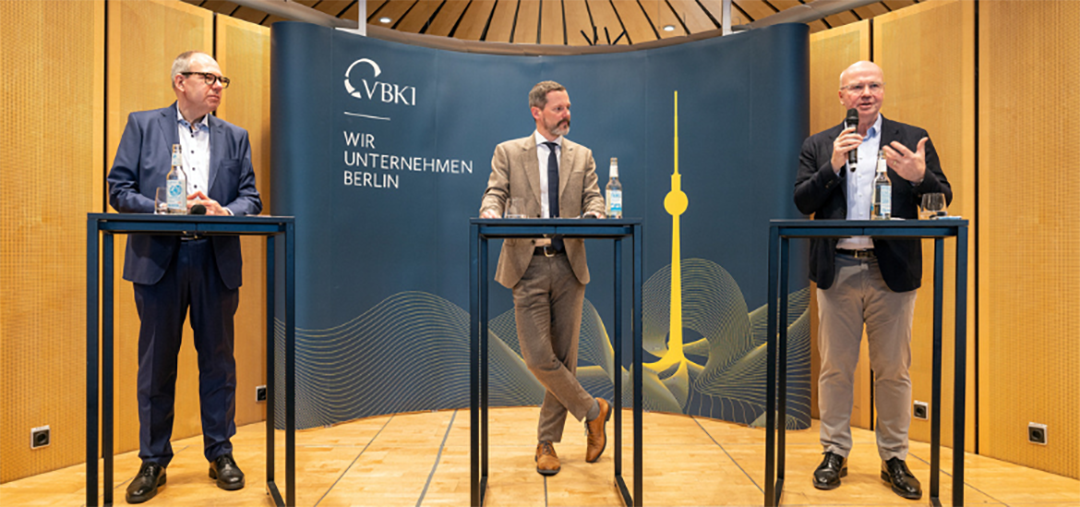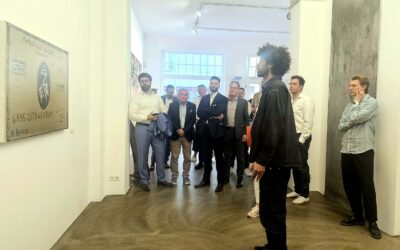The legislative period is already at an advanced stage and the CDU and SPD negotiating delegations are under great time pressure. Net, they have around three years to produce presentable results together, says Henner Bunde.
Together with VBKI President Markus Voigt, the head of our Economic Policy Committee analyzed the current status of the coalition talks. Dr. Thomas Letz, Deputy Managing Director of the VBKI, moderated the Business Breakfast in the VBKI's Goldberger Saal.
Unlike Henner Bunde, who has often accompanied coalition negotiations in various functions since the early 1990s, Markus Voigt (non-party) is sitting at the table for the first time as a representative of the city council appointed by the CDU. "It's a lot of hard work," he summarized his impressions. The atmosphere in the discussions was good, sometimes the differences within the parties involved were greater than between them. For him personally, the change of perspective was very instructive. The approaches and ways of thinking in politics differ significantly from those that are common in business. "Overall, however, the idealism of the people who take on responsibility in politics is admirable."
While Markus Voigt is one of 16 members of the "Building, Housing, Urban Development" working group, Henner Bunde is a member of the "Finance" working group. What will the future financial situation be like in the state of Berlin? According to Henner Bunde, tax revenues are likely to continue to rise due to inflation. However, it is foreseeable that the financial scope for action will not increase to the same extent, as not only is the debt brake back in force, but costs are also skyrocketing. For example, the interest expenses of the country, which remains highly indebted: Whereas only a short time ago corresponding bonds were paying negative interest, the premium is now 2.7 percent. Personnel costs are also likely to rise, with the state's 135,000 employees demanding higher wages and salaries. Finally, the state also has a stake in 56 municipal companies, with 1.4 billion euros flowing into local public transport. Subsidizing the 29-euro ticket alone is likely to cost the state around 400 million euros.
The exploding costs - in this case the construction costs - also concern the urban development working group. Markus Voigt does not see how the target for the construction of new apartments can be achieved under the current circumstances. "If there are no massive subsidies, we will manage perhaps half of the planned 20,000 new apartments per year." The central task of the entire city must be to create a "maximally friendly climate" for investors. Among other things, he positively highlighted the efforts of the negotiating partners to once again give greater priority to promoting property ownership.
The key to numerous challenges on Berlin's future agenda will be the reform of the administration. The VBKI has been intensively involved in the relevant consultations in recent months, and Henner Bunde describes key positions: In addition to a clear division of responsibilities and a digitalization of procedures, a new mindset in the administration - characterized by individual decision-making - is particularly important. One thing is clear: "More staff alone is not the solution."
What happens now? The coalition agreement will be presented at the beginning of April, after which the agreement must be approved by a vote of the SPD members. If this vote is in favor of the agreement, the new state government should start work at the beginning of May. How will it change Berlin? Markus Voigt is hopeful: "There is more overlap and common ground within the alliance than with the red-green-red coalition." He expects the future Senate to take action. Henner Bunde is also confident that black-red will get down to work dynamically: "Both partners are interested in achieving something presentable in the remaining three years". Optimism is also high in the hall. The 60 or so guests were asked via Mentimeter: Do you have a fundamentally positive attitude towards the expected new coalition between the CDU and SPD? A whopping 90 percent answered "yes".
Impressions
To the picture gallery: Please click here>
You might also be interested in
From Generative AI to Agentic AI
VBKI visits Microsoft Experience Center Munich
Face Your Fear
Art as confrontation: Before the Gallery Weekend, the VBKI met Noah Becker's bold visual worlds.
"HR must lose its fear of numbers"
Strategic thinking in focus at the first CHRO event organized by CEOs for Berlin









